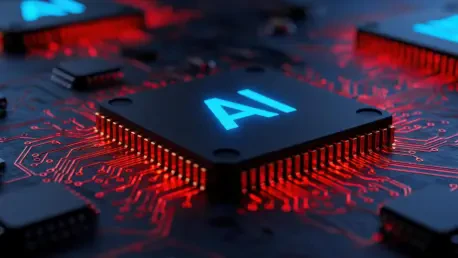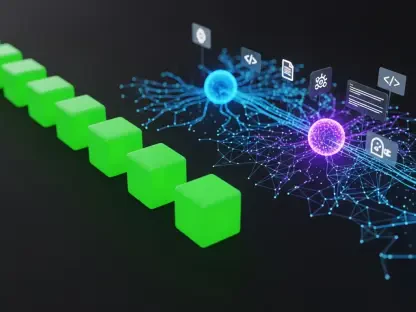The Current Landscape of Software Development and AI Integration
The software development industry stands as a cornerstone of the digital economy, driving innovation across sectors with an unrelenting demand for faster, more adaptable solutions. Businesses today face immense pressure to deliver cutting-edge applications amidst shrinking timelines and tightening budgets, often grappling with the inefficiencies of traditional development cycles. This challenging environment has set the stage for a seismic shift, as artificial intelligence emerges as a powerful ally in overcoming long-standing hurdles.
AI integration is redefining software development by tackling issues such as project delays, escalating costs, and the heavy burden of ongoing maintenance. By automating repetitive tasks and providing intelligent insights, AI tools are enabling developers to focus on strategic problem-solving rather than mundane coding chores. This transformation is not just a trend but a fundamental change in how software is conceptualized and delivered, promising a future of heightened efficiency.
Key players like GitHub Copilot, powered by advanced language models, exemplify the technological advancements propelling this shift. Alongside other AI-driven platforms, these tools are shaping an industry where automation and intelligence converge to streamline workflows. Major tech companies and startups alike are investing heavily in AI solutions, signaling a broader movement toward smarter development practices that prioritize speed and innovation.
Key Trends and Impacts of AI in Software Development
Emerging AI-Driven Innovations and Practices
A wave of AI-driven innovations is reshaping the software development landscape, with automation at the forefront of this revolution. Tasks such as coding, debugging, and testing, once time-intensive and error-prone, are now being handled by sophisticated AI tools that generate code snippets and identify bugs in real time. This shift allows developers to allocate their energy to more creative aspects of application design.
The rise of agentic AI represents another groundbreaking trend, introducing autonomous systems capable of optimizing workflows and managing resources without human intervention. These intelligent agents can anticipate system failures, allocate infrastructure dynamically, and resolve issues proactively, reducing downtime significantly. Such capabilities are proving invaluable in maintaining seamless operations for complex software environments.
Additionally, AI is enhancing the developer experience by personalizing workflows and minimizing cognitive overload. By automating repetitive processes like code refactoring and test writing, these tools foster an environment where creativity thrives over routine labor. This focus on improving job satisfaction and productivity underscores a broader push to balance technology with human ingenuity in development spaces.
Market Growth and Performance Metrics
Adoption rates for AI tools in software development are climbing rapidly, with studies showing productivity gains of up to 55% faster coding through platforms like GitHub Copilot. These tools are not only accelerating project timelines but also enhancing the quality of outputs, as developers leverage AI suggestions to refine their work. The data paints a clear picture of an industry embracing transformation at an unprecedented pace.
Looking ahead, market projections indicate robust growth for AI in software development, with significant cost savings and efficiency improvements expected over the next few years, from 2025 to 2027. Analysts predict that organizations adopting AI will reduce operational expenses while scaling their capacity to handle larger, more complex projects. This financial and operational advantage is becoming a critical differentiator in competitive markets.
Furthermore, the correlation between AI adoption and improved software quality is strengthening market competitiveness. Companies utilizing AI-driven testing and predictive maintenance are reporting fewer post-launch issues and higher user satisfaction rates. As these metrics continue to validate AI’s impact, the push for broader implementation across enterprises is likely to intensify, shaping a more resilient industry.
Challenges in Adopting AI for Software Development
Implementing AI in software development is not without obstacles, as technical complexities pose a significant barrier for many organizations. Integrating AI tools with existing legacy systems often requires substantial reconfiguration, creating delays and unforeseen costs. This challenge is compounded by a noticeable skill gap among developers, many of whom lack the training to fully harness AI capabilities.
Beyond technical hurdles, risks such as over-reliance on AI tools loom large, potentially stifling critical thinking and innovation if not managed carefully. Data privacy concerns also emerge as a pressing issue, with AI systems often requiring access to sensitive information to function effectively. Ethical implications, including accountability for AI-generated code, further complicate the adoption landscape, demanding careful consideration.
To navigate these challenges, strategies like upskilling development teams through targeted training programs are essential. Establishing robust security protocols to safeguard data and ensuring regular audits of AI outputs can mitigate risks significantly. By fostering a balanced approach that combines human oversight with technological advancement, organizations can address these barriers while maximizing AI’s benefits.
Regulatory and Compliance Considerations in AI-Driven Development
The regulatory landscape surrounding AI in software development is evolving, with data protection laws becoming increasingly stringent to address privacy concerns. Governments and industry bodies are emphasizing the need for transparency in how AI tools process and store information, pushing companies to adopt stricter compliance measures. This scrutiny is particularly relevant for applications handling personal or proprietary data.
Intellectual property concerns also play a critical role, as questions arise over ownership and accountability for AI-generated code. Ensuring compliance with established standards is vital to avoid legal pitfalls and maintain trust in automated processes. Organizations must prioritize clear documentation and traceability to navigate this complex terrain effectively.
Security remains a paramount consideration, as AI tools can inadvertently introduce vulnerabilities if not properly monitored. Protecting against these risks requires integrating advanced cybersecurity measures into development pipelines, alongside regular updates to address emerging threats. As regulations tighten, adherence to best practices in security and transparency will shape industry standards, influencing how AI is deployed in software projects.
The Future of AI in Software Development
Looking toward the horizon, AI’s role in software development is poised for even greater expansion, driven by advancements in machine learning models and autonomous agents. These technologies promise to further refine automation, enabling systems that not only execute tasks but also adapt and learn from real-world interactions. Such progress hints at a future where software creation becomes increasingly intuitive and self-sustaining.
Potential disruptors, including the evolution of programming languages like Rust and Go, are aligning with AI-driven needs in cloud computing and microservices architectures. These languages offer enhanced performance and security, making them ideal for modern applications that demand scalability. Their growing prominence suggests a shift in how developers approach coding in an AI-integrated ecosystem.
Global economic conditions, rising consumer expectations for innovation, and shifting regulatory frameworks will continue to influence AI’s trajectory in this field. As businesses strive to meet these demands, areas like predictive analytics and personalized application features are expected to see significant growth. Staying attuned to these external factors will be crucial for organizations aiming to leverage AI for long-term success in software development.
Conclusion: Embracing AI for a Competitive Edge
Reflecting on the insights gathered, it becomes evident that AI has fundamentally altered software development by delivering unmatched speed, superior quality, and groundbreaking innovation. The journey through various trends and challenges highlighted how this technology has empowered developers and organizations alike to surpass traditional limitations. Its impact has been profound, setting a new benchmark for what is achievable in the digital realm.
Moving forward, businesses are encouraged to take decisive action by investing in AI tools tailored to their specific needs, ensuring they remain at the forefront of industry advancements. Prioritizing comprehensive training for developers has proven essential, equipping teams with the skills to navigate an AI-driven landscape effectively. By staying proactive in monitoring regulatory changes and adopting emerging technologies, companies can secure a lasting competitive edge in a rapidly evolving market.









